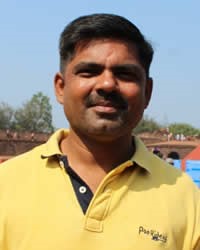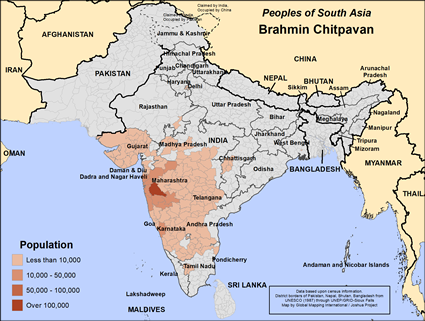Brahmin Chitpavan in India

Photo Source:
Anonymous
|

Map Source:
People Group data: Omid. Map geography: UNESCO / GMI. Map Design: Joshua Project.
|
| People Name: | Brahmin Chitpavan |
| Country: | India |
| 10/40 Window: | Yes |
| Population: | 486,000 |
| World Population: | 486,000 |
| Primary Language: | Marathi |
| Primary Religion: | Hinduism |
| Christian Adherents: | 0.00 % |
| Evangelicals: | 0.00 % |
| Scripture: | Complete Bible |
| Ministry Resources: | Yes |
| Jesus Film: | Yes |
| Audio Recordings: | Yes |
| People Cluster: | South Asia Forward Caste - Brahmin |
| Affinity Bloc: | South Asian Peoples |
| Progress Level: |
|
Introduction / History
The Brahmin Chitpavan live in west central India. Their name Chitpavan means those "pure of mind." They were the leading nobles of the Maratha Empire (1674 to 1818), the dominant state in 18th century India. The Peshwa or Prime Minister of the Maratha Empire was a Chitpavan and he rewarded the fellow member of his caste with high positions and land. When the British took control of the empire in 1818, the Brahmin Chitpavan lost much of their influence and power. They began learning English and soon became officials in the British East India Company and later British Empire.
There has been a fierce rivalry between the Brahmin Deshastha and the Brahmin Chitpavan for hundreds of years. The Deshastha consider the Chitpavan inferior to themselves.
The man who assassinated Mahatma Gandhi in 1948 was a member of the Brahmin Chitpavan caste. This action led to strong feelings against all Brahmins by the lower castes.
The primary language of the Chitpavan is Marathi. They also speak English, Hindi and other local Indian languages.
Where Are they Located?
The majority of the Brahmin Chitpavan today lives in the Indian state of Maharashtra. Others also live Kanarkata, Gujarat and other regions of India.
What Are Their Lives Like?
The Brahmin Chitpavan encourage their children to obtain university educations. Modern Chitpavan still work in their traditional occupation as priests and Hindu scholars. Many have entered the fields of computer science, engineering, law, the military and private business. There is a strong work ethic among the Chitpavan. As a result they strive for leadership in any area where they are employed.
The Brahmin Chitpavan are endogamous, that is they marry within their group or with other Brahmins. Families arrange marriages with the consent of the young people. Sons inherit property with the eldest son gaining his father's titles and home.
The Chitpavan are vegetarians. Their main foods are rice, wheat, lentils, vegetables and fruit.
What Are Their Beliefs?
The Chitpavan practice Hinduism, the ancient religion and culture of India. They worship and serve the many gods of the Hindu pantheon. The Chitpavan believe that Moksha, freedom from the endless cycle of reincarnation, can be achieved through rituals and good works.
The Chitpavan participate in and often lead the yearly Hindu holidays of Holi, the festival of colors, Diwali, the festival of lights and Navratri the nine-day celebration of autumn.
What Are Their Needs?
The Brahmin Chitpavan as an influential and generally well-to-do community. Their main needs involve relational strains that are usually kept behind closed doors. Modernization is breaking down family units that have been the glue to society for many generations, and loneliness is increasingly a problem. They are expected to "achieve it all," but ironically, achieving it all can be empty. Most of all, the Chitpavan need to hear the life-changing gospel of Jesus Christ in a way they can understand.
Prayer Points
Pray for Christ to reveal Himself to Brahman Chitpavan leaders.
Pray for Holy Spirit directed Christ followers to go to Brahmin Chitpavan communities.
Pray for a disciple making movement to emerge among every Brahmin Chitpavan community.